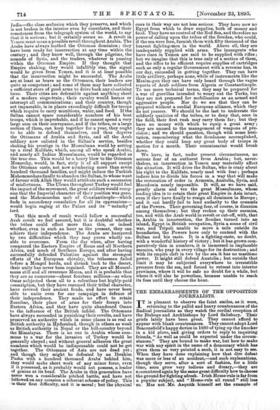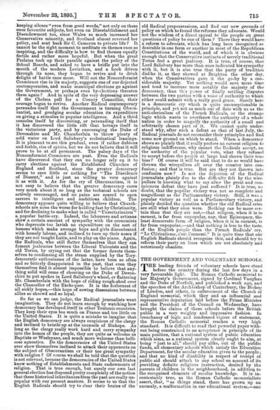THE EMBARRASSMENTS OF THE OPPOSITION JOURNALISTS.
IT is pleasant to observe the faint smiles, as it were, returning to the pallid and heavy countenances of the Radical journalists as they watch the cordial reception of the Bishops and Archbishops by Lord Salisbury. Their griefs lately have been great. They cannot afford to appear with blank countenances. They cannot adopt Lord Beaconsfield's happy device in 1880 of tying up the knocker in a kid glove, and giving orders to reply to inquiring friends, "As well as could be expected under the circum- stances." They are bound to make war, but how to make war with any spirit in the name of a democracy which has given them so very pointed a snub, it is not easy to see. When they have done explaining how that dire defeat was more or less of an accident,—and such explanations, though they serve, after a sort of fashion, for a little time, soon grow very tedious and dreary,—they are encountered again by the same great difficulty how to choose the ground for fighting afresh. Irish Home-rule is far from a popular subject, and "Home-rule all round" still less so. Has not Mr. Asquith himself set the example of keeping silence "even from good words," not only on these once favourite subjects, but even on Disesta,blishment and Disendowment too, since Wales so much increased her Conservative minority, and Scotland almost reversed her policy, and sent back Sir C. Cameron to private life ? It cannot be the right moment to meditate on themes once so inspiring, and the difficulty is how to find themes equally fertile and rather more hopeful. But when the great Prelates took up their parable against the policy of the School Boards, and asked to have a bridle put into the mouth of the modern Leviathan, and a hook driven through its nose, they began to revive and to drink delight of battle once more. Will not the Nonconformist Conscience rise in its majesty, suggests one of our dejected contemporaries, and make municipal elections go against the Government, or perhaps even by-elections threaten them again ? And in spite of the very depressing answer of the Chelsea poll for a County Councillor, their courage began to revive. Another Radical contemporary persuades itself that the Government is turning Obscu- rantist, and grudging secular education its expenditure on giving a stimulus to popular intelligence. And a third consoles itself by discovering, or persuading itself that it has discovered the little rift that betrays itself in the victorious party, and by encouraging the Duke of Devonshire and Mr. Chamberlain to throw plenty of cold water on Lord Salisbury's ecclesiastical leanings. It is pleasant to see this gradual, even if rather dubious and feeble, rise of spirits, but we do not believe that it will prove to be at all permanent. The palmy days of the Nonconformist Conscience are past. Even the Radicals have discovered that they can no longer rely on it to carry elections against the Established Churches of England and Scotland, since the greater democracy seems to care little or nothing for "The Dissidence of Dissent," and is just as willing to vote against it as with it. As for the cry of Obscurantism, it is not easy to believe that the greater democracy cares very much about it so long as the technical schools are actively encouraged, and no pains are spared to open careers to intelligent and ambitions children. The democracy appears quite willing to believe that Church- schools are none the worse for holding fast by Christianity, and for declining to make what is called " Unsectarianism " a popular battle-cry. Indeed, the labourers and artisans show a certain amount of sympathy with the economists who deprecate too lavish an expenditure on the sort of lessons which make average boys and girls discontented with homely labour, and inclined to turn up their noses if they are not taught Latin, and to play on the piano. Again, the Radicals, who still flatter themselves that they can foment jealousies between the Liberal Unionists and the old Tories, by crying out that the former devote them- selves to condensing all the steam supplied by the Tory- democratic enthusiasms of the latter, have been so often and so bitterly disappointed in the past, that even they themselves find it almost impossible to believe that any- thing solid will come of cheering on the Duke of Devon- shire to put spokes in Lord Salisbury's wheel, or flattering Mr. Chamberlain with the hope of riding rough-shod over the Chancellor of the Exchequer. It is the forlornest of all sickly hopes,—this hope of sowing dissensions between allies so shrewd and so loyal So far as we can judge, the Radical journalists want imagination. They do not learn enough by watching how democracy has developed itself in other Teutonic countries. They keep their eyes too much on France and too little on the United States. It is quite a mistake to imagine that the English democracy are always suspicious of the clergy and inclined to bristle up at the counsels of Bishops. As long as the clergy really work hard and carry sympathy into the homes of the people, they are quite as welcome as Baptists or Wesleyans, and much more welcome than belli- cose agnostics. Do the democracies of the United States ever show themselves inclined to attack their opponents on the subject of Obscurantism or their too great sympathy with religion ? Of course we shall be told that the question is not relevant, because the democracies of the United States know nothing of Establishments and State endowments of religion. That is true enough, but surely our own last general election has disposed pretty completely of the notion that these historical inheritances from the past are really un- popular with our present masters. It seems to us that the English Radicals should try to clear their brains of the old Radical prepossessions, and find out new grounds of policy-cu which to found thereforms they advocate. Would not the wisdom of a direct appeal to the people on great questions of policy be one of them ? There they would have a reform to advocate, which has long been recognised as desirable in one form or another in most of the Republican Constitutions of the world, and of which it is obvious enough that the Conservative instincts of merely traditional Tories feel a great jealousy. It is true, of course, that Lord Salisbury has more than once indicated his sympathy with it, but it is also true that the party of tradition dislike it, as they showed at Brighton the other day, when the Conservatives gave it the go-by by a Con- siderable majority. Yet nothing would save more time and tend to increase more notably the majesty of the democracy, than this power of finally settling disputes between the two parties with a voice of authority to which either could submit with a really good grace. Surely here is a democratic cry which is quite unexceptionable in principle, and yet not as much out of date with us as the anti-clericalism of the French Radicals, or the strange logic which wants to overthrow the authority of a whole nation in order to magnify the authority of a small and arbitrarily chosen part of it. We cannot quite under- stand why, after such a defeat as that of last July, the Radical journals do not reconsider their principles and find some new ground on which to stand. When a democracy shows so plainly that it really prefers an earnest religion to religious indifference, why cannot the Radicals accept, on the authority of the popular vote, what they refused to accept before the people at large had shown their true bias ? Of course it will be said that to do so would have thrown the wirepullers all over the country into con- fusion ; and that is true. But are they not thrown into confusion now ? Is not the dejection of the Radical journalists plainly due to the difficulty felt by the wire- pullers in knowing what to say after the great and con- spicuous defeat they have just suffered ? It is true, no doubt, that the popular victory was not so complete and magnificent as the Parliamentary victory. Still, it was a. popular victory as well as a Parliamentary victory, and plainly decided the question whether the old Radical cries are still what they once were. Nothing can be more cer- tain than that they are not,—that religion, when it is in earnest, is far from unpopular, nay, that Episcopacy, the least democratic form of religion, when it is in earnest, is far from unpopular,—and that nothing is less to the taste. of the English people than the French Radicals' cry, "Le Cl4ricalisme, c'est l'ennemi." It is quite time that our English Radicals should recognise this, and should try to reform their party on lines which are not absolutely and notoriously obsolete.











































 Previous page
Previous page